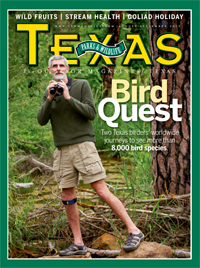
From the Pen of Carter P. Smith
The start of summer kicked off a bad couple of weeks in the war on aquatic invasive species.
First, it was the discovery of zebra mussels in Lake Lewisville, a popular recreational lake in the DFW Metroplex. Just a week later, a University of Texas at Arlington scientist confirmed the presence of the species in Lake Bridgeport, a water body on the West Fork of the Trinity River. It was the first time in Texas that this exotic species had been documented outside of the East Fork of the Trinity.
These findings were on top of an alarming report from Toledo Bend along the Sabine River, where biologists were reporting an impenetrable floating mat of giant salvinia that had grown in size to several thousand acres. If left untreated by herbicidal application, the plant would no doubt overtake even more surface acreage, thereby blocking angling and boating access to portions of the popular lake and causing problems for water managers, lakeside communities and area residents.
For the uninitiated, zebra mussels are a particularly pernicious and difficult-to-combat species of exotic freshwater clam. Originally from the waters of Eastern Europe, zebra mussels made their way to the United States courtesy of a ship that dumped its infested ballast water into the Great Lakes. Since their arrival in the U.S., the mussels have gradually spread southward, now colonizing waterways in 29 states, including Texas, where they were discovered in Lake Texoma in 2009.
About the size of one’s fingernail, the mussel, named for its characteristic zebra-like stripes, reproduces prodigiously. Zebra mussels have few natural predators, and outside of chemical processing at water treatment plants, there are no known controls, biological or otherwise, capable of killing them at any meaningful scale. Unchecked, they displace native species of fish and wildlife, negatively affect water quality, create serious recreational hazards, disrupt water supplies, harm boating equipment and cause economic damage to a wide array of water-dependent industries.
Once present in a water body, the mussels affix themselves to any and all hard substrates. Dock pilings, wharfs, cables, poles and lake bottoms are all fair game. So, too, are water intake pipes, valves, filters and pipelines, as well as boats, motors and trailers, where the diminutive mussels can frequently go unnoticed. Unwitting boaters may then spread the exotic mussels from lake to lake if precautions are not taken to adequately clean, drain and dry equipment.
Suffice it to say, the further expansion of zebra mussels is a most unwelcome development. Scientists, lake managers, marina operators, river authorities and municipalities in North Texas, already reeling from Sisyphean-like fights against the proliferation of harmful aquatic invasive plants such as giant salvinia, have steeled themselves for another push to “hold the line” against the spread of zebra mussels.
For better or worse, TPWD fisheries biologists and our partners are well practiced in the war on aquatic exotics. One of the important arrows in our quiver is an aggressive outreach campaign aimed at educating boaters and anglers about the dangers of spreading invasive species from lake to lake. A targeted campaign, with the tagline “Hello Zebra Mussels, Goodbye Texas Lakes,” reminds boaters what is at stake, as well as the steps they can take to clean, drain and dry boats, motors and trailers when moving them from lake to lake. In the war against exotic species, an ounce of prevention is worth way more than a pound of cure.
Protecting our lands, waters, fish, wildlife and parks is a job for all of us, and needless to say, nobody takes care of Texas like Texans. This summer, TPWD joined the Texas Commission on Environmental Quality and country music singer and outdoorsman Kevin Fowler to launch a public service campaign called Take Care of Texas. As Kevin reminds us in the campaign’s theme song, “Take care of Texas. It’s the only one we’ve got.”
Thanks for caring about our wild things and wild places. They need you now more than ever.
Related stories
Zebra Mussels Are Unwelcome Visitors
Texas Under Attack From Invasive Plants

